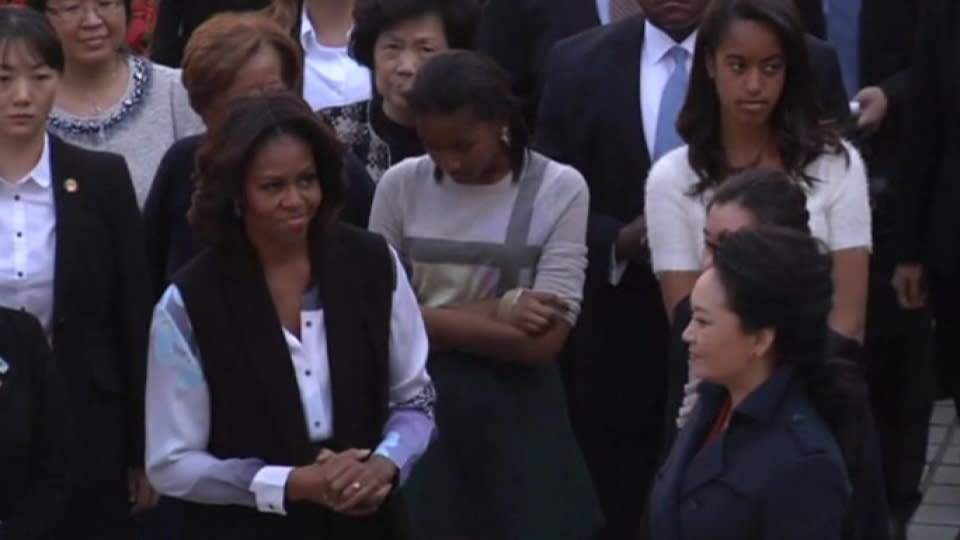Mrs Xi Jinping: China's new source of soft power?

Known first as a folk singer and later as China's first lady, Peng Liyuan has always been a mainland media darling.
Widely viewed as China's most high-profile political spouse since Jiang Qing, the late wife of revolutionary leader Mao Zedong, the 52-year-old is seen playing a crucial role in the Asian economic giant's public diplomacy.
According to research by Renmin University of China, Peng's "elegant manners" and participation in various charitable events could enhance China's soft power and temper fears stemming from its economic ascent.
"China has conveyed kindness and goodwill to the world through the first lady's public diplomacy when the country has been challenged amid a rapid economic development," said the report. Peng has "enchanted local and foreign media" with her personal appearance, charitable acts and musical performances, it added.
Married to Chinese president Xi Jinping in 1987, Peng ranked 57th in Forbes's list of the world's most powerful women last year.
A regular fixture on China's national TV during the height of her popularity as a singer, Peng receives significant attention from the state media when she tours with her husband abroad or attends philanthropic events within the country.
Analysts tell CNBC this is rare in the history of Chinese politics, with previous first ladies of Deng Xiaoping, Jiang Zemin and Hu Jintao staying largely behind the scenes. The prominence of "Mother Peng" could be attributed to her background as an entertainer and her "squeaky-clean image."
"The attention was her own making. Most Chinese knew her even before she became the first lady. While she is less well known among the younger generation, people above 30 years old surely know her," Dr. Li Mingjian, associate professor at S. Rajaratnam School of International Studies, Nanyang Technological University (NTU), told CNBC by phone.
"It is also inevitable for popular singers to have negative rumors, but in Peng's case, there are nearly none. She has built a fairly positive image of herself," he added.
Some have drawn parallels between China's first lady and Carla Bruni - the singer-songwriter turned French first lady after marrying former French president Nicolas Sarkozy in 2008. The stylish Peng has also been named alongside U.S.'s Michelle Obama as the "First ladies of fashion."
"The international world usually diminishes China as a threat, and China's products being bad. However, most foreign media now see Peng Liyuan as a positive factor raising China's image and have called her 'China's new business card'," Zhou Jiali, a researcher from China Foreign Affairs University, wrote in a report.
Read More Why China won't be Asia's dominant power
While Peng is a media darling, experts tell CNBC that Renmin University's report likely exaggerated her role in China's diplomacy. While China is intent on building a positive image via the first lady's commitment to health and education, the effect is limited.
"Soft power comes from other factors that are more important than a first lady. For example, success stories about social mobility where Alibaba 's Jack Ma would be a prime example that can induce admiration for China," NTU's Li said. "The ability to provide international public goods and shape international agenda like the Asian Infrastructure Investment Bank also enhances China's attraction."
But some analysts credit Peng with humanizing the ruling party's image.
"The image of the Communist Party used to be very dull and leaders behaved like robots with no personal charm [but] Peng Liyuan brought something different to the table," said Li Yinhe, an analyst at the Chinese Academy of Social Sciences.
Political watchers are also skeptical that China's new-found love for its first lady could spearhead foreign policy changes.
"Peng may be an exception in many aspects. Firstly, her successor may not have her character and personal qualities. Secondly, as Peng doesn't speak English, there will be a barrier even if China wants to take better advantage of its first lady," NTU's Li told CNBC.
Furthermore, traditional Chinese norms that discourage the first lady from being too high-profile in the public arena could be a deterrence.
More From CNBC


